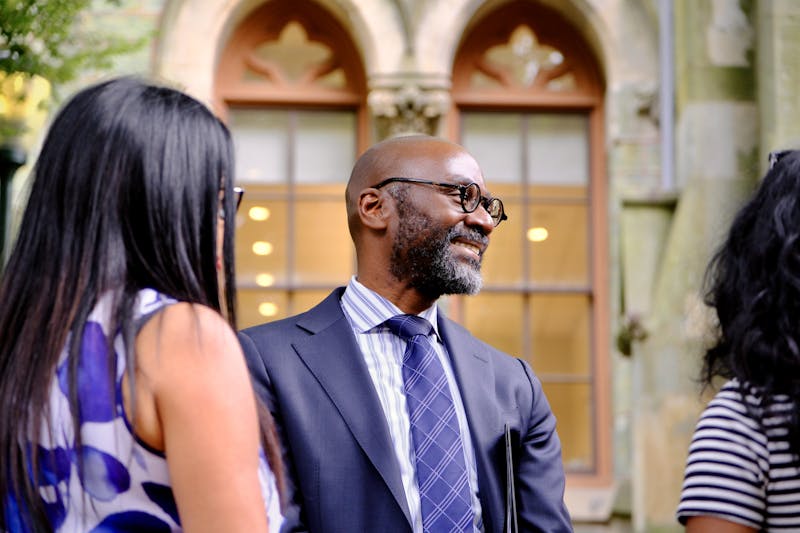Baseball is a game of dreams. Every young child who steps onto a field to play his first little league game fantasizes about one day playing professional ball. For former Penn student Mark DeRosa, this simple dream is rapidly becoming a reality. DeRosa, a product of Carlstadt, N.J., is one of the top infield prospects in the Atlanta Braves organization. Next week, the 23-year-old shortstop will embark on his third professional season, beginning in Greenville, S.C., the Braves' double-A affiliate. DeRosa, who in addition to being Penn's shortstop was also its starting quarterback, left Penn following his junior year to pursue his baseball career. And as he ascends up the minor league ladder, he said has no regrets about his decision to leave school early. "My experience at Penn was phenomenal," DeRosa said. "I made some good friends, and we had some great teams, but at that point I felt it was time to start my professional career." DeRosa's parents acknowledge his decision to leave school and football behind was a difficult, but necessary one in order to facilitate his future in baseball. "Realistically, I would have liked to see him finish his degree because I know how difficult it is going to be as the seasons progress," DeRosa's mother said. "But when you look at the overall picture, he had to leave then in order to get the opportunities that he is receiving now and get a fair shot at making it to the major leagues." While at Penn, DeRosa established himself as one of the best athletes in recent Quaker history. He was the shortstop for a Penn baseball team that won three Ivy League titles, and the starting quarterback for the undefeated and Ivy-champion 1994 football team. "Mark was a good player for us, although he did not have extraordinary numbers," Quaker baseball coach Bob Seddon said. "We felt he was a prospect early on just because of his leadership and exceptional athletic ability. He can run, throw, and hit, all the tools one needs to be a great player." The choice to play baseball was officially made after his junior year, but for DeRosa, the idea cemented itself during the previous summer. Following his sophomore year, DeRosa took part in the Cape Cod League, a showcase of some of the best collegiate players in the nation. He then proceeded to make his name a recognizable one amongst scouts, finishing eighth in the league in average and starting as the shortstop for the all-star team. "I think that Mark always knew he was good," his father, John, said. "When he performed well on Cape Cod, that's when he realized that he could compete with any ball player no matter where they came from in the country." Seddon recalls the trip that he took with DeRosa to Omaha, Nebraska in which he realized that DeRosa was ready to turn pro. "I drove him to the airport the day before the draft, and I knew that he would leave if he were drafted in the first seven or eight rounds," Seddon said. "He was here for his education first and baseball second, but all I wanted was what was best for Mark. It would have been selfish to be upset at his decision." DeRosa's gamble to forgo college and a possible career in football paid off as he was drafted in the seventh round of the June 1996 amateur draft. "I was excited that I went pretty high, and it made me confident to know that an organization like the Braves felt strongly about me, DeRosa said. "I really didn't have a preference; I just wanted to go to an organization that wasn't strong with middle infielders in the minor leagues." With the parent club relying on the talents of 34-year-old Walt Weiss and 36-year-old Rafael Belliard to captain their infield this year, the minor league staff of the Braves is placing much of its stock in the development of DeRosa's skills. "Mark's fortunate to be in a fine organization with stop-gap veterans at the position that he plays," Seddon said. "It's up to him. If he plays well the Braves will look in his direction." Up to this point, DeRosa has not disappointed. In his first season, he went to single-A Eugene, Oregon where he hit .259 in 70 games. The following year, DeRosa was promoted to Durham and compiled a .269 average with 8 home runs and 37 RBIs in 92 games before breaking his hand midway through the season. Those first two years, though, also awakened DeRosa to the realities of being a professional baseball player. Moving thousands of miles from home and traveling from city to city on long bus rides was a difficult adjustment for a young player. "I was a little skeptical going out to Eugene. Coming from New Jersey. At first that didn't seem too appealing," admits DeRosa. "The biggest lessons I learned in my two years was just to treat each game as its own separate entity and go to the ballpark everyday with a new attitude. It's such a grind on a day to day basis that it can beat you up mentally if you let it." This spring, DeRosa had an opportunity to take his new found attitude into the Braves spring training complex in Disney World, as he earned a spot as a non-roster invitee to camp. While there were no guarantees of what the invitation would lead to, DeRosa wanted to use the opportunity to open some major league eyes and hopefully a few doors. "I really didn't have any expectations going in. I just wanted to show Bobby Cox and the Braves organization that I could fit in and do the job that was asked of me," DeRosa said. DeRosa picked up three hits in 11 at-bats during his three week tour of duty. Even more than having success against major league talent, the experience of being around established players on a daily basis is something that he will never forget. "Being in a major league environment is absolutely indescribable," DeRosa said. "For anyone who is in the minor leagues you can sometimes lose focus of the goal, but things like taking ground balls everyday with Walt Weiss and picking up pointers that he has taken to his game was amazing and makes you want to work that much harder." The next step for DeRosa is to take his experience at spring training and translate it into an improvement in his game over the next year. While being able to handle the bat well is an important aspect of the game, he also wants to improve his fielding and become a more consistent player throughout the course of an entire season. Whether the Atlanta Braves beckon him three months from now or three years from now, DeRosa knows that professional baseball will play a role in his future. "Baseball is my future," DeRosa said. "I don't want to do anything else, nor do I see myself doing anything for a long time." Despite the fast track that he is on to reach the major leagues, DeRosa maintains that he will complete his degree at Penn. DeRosa was a marketing major in the Wharton School, and with only ten credits remaining in order to graduate, he has said that the minute he has an off-season free, he'll be back on campus. "That's a must," his father said. "You don't pass up a Wharton degree. God willing, he can be a professional baseball player until he is 35 or 36, but then where does he go? If he ever gets hurt he can be out of baseball when he's 24. You can't walk away from an Ivy Leauge education." Like so many other athletes that have come before him, Mark DeRosa has longed for the days when he can hear his name announced over the public address system in a major league stadium. Unlike those same athletes, he has not lost sight of the importance of hard work, dedication, and above all receiving an education. With glove, bat, and knowledge well in hand, DeRosa is poised to make mark on the game that he loves sooner, rather than later.
The Daily Pennsylvanian is an independent, student-run newspaper. Please consider making a donation to support the coverage that shapes the University. Your generosity ensures a future of strong journalism at Penn.
DonatePlease note All comments are eligible for publication in The Daily Pennsylvanian.







